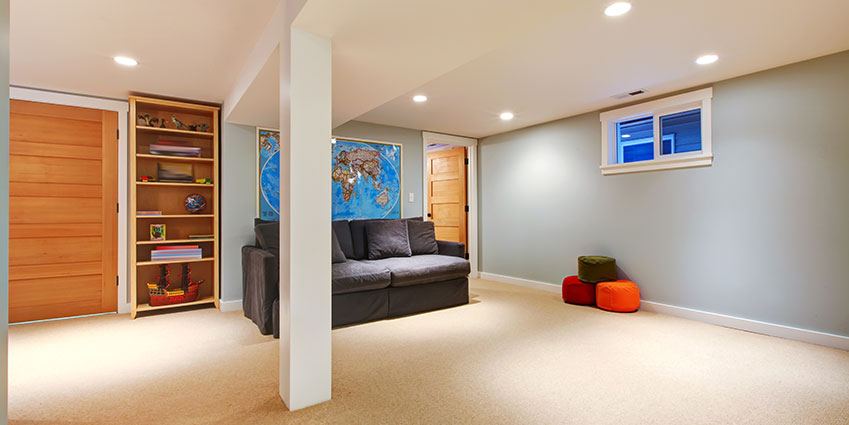When selecting the perfect match for flooring in your home, there are seemingly endless possibilities.
The basement, however, is a trickier situation that can require a bit more consideration.
Due to the fact that basements are below grade and the lowest surface in your home, the key to successful flooring installations is to ensure that it’s dry and that there is a smooth, flat surface for the new finish material.
Here’s a look at some of popular flooring choices for basements.
Carpeting
Besides being warmer and providing a layer of soundproofing, carpet just has a cozier feel, especially for a room without sunlight and windows.
Wall-to-wall carpeting is one of the most economical options and is relatively easy to install.
For example, a mid-range carpet cost could run around $1 to $3 per square foot. Carpet tiles are another popular option, with 20 inch nylon pile weighing in around $2 to $4 per sq. ft., not including installation costs which can widely vary.
The colors and styles can really dress up a drab space. Unfortunately for areas with moisture problems, mildew and mold can occur and become trapped within the carpet.
Engineered Wood
Natural hardwood has never been a real option with basement flooring, but now with engineered hardwood, the problems with warping, cracking, and installation method concerns are a thing of the past.
Given the materials of engineered hardwood (plywood and thin veneer of laminated solid wood), temperature and moisture fluctuations can be withstood more easily.
Depending on the variety (you’ll want to check that they’re rated for below-grade spaces), engineered wood can either be glued to the basement floor or floated over a thin layer of foam sheeting and locked together.
The planks themselves are priced between $2 to $20 per square foot, not including installation costs, a reasonable cost for the look of finished hardwood floor, but a bit costly if any sort of water or uneven floor issues exist that may result in premature replacement.
Rubber Flooring
In terms of resilient flooring, rubber is not only durable and easy to clean, but can last up to 20 years.
The softness of such a floor makes it a perfect space for activity and versatility. Unlike the limited options of yesterday, rubber flooring is now offered in a variety of colors and patterns, though not near the convincing look of engineered wood or luxury vinyl tiles.
Though water-resistant, this flooring type can be slippery when moist and is also prone to staining with certain chemicals.
Living-space-grade rubber flooring is often upwards of $12 – $15 a square foot, not including installation costs which can widely vary.
Ceramic Tile
In searching for a highly durable, water-resistant flooring, glazed ceramic tile is a popular choice, blocking water from penetrating your floor.
The tiles are not susceptible to mildew or mold growth (the grout can be, however).
Though cold and hard to the feet, ceramic tile is an excellent long term choice (a fact that is reflected in the price of $3 to $7 per square foot, not including installation costs).
The variety of colors and patterns is large, including even wood replication, making for a very unique and personalized addition in your home.
Concrete
A minimalist’s dream, one of the simplest and cheapest options for finishing a basement concrete slab is paint.
A one-gallon can (be sure to get an acrylic slip-resistant surface finish) is about $30, not including installation, and covers about 80-100 square foot.
This option is more short term, as wear will begin to show in high traffic areas and requires repainting around 3-5 years.
Other basement flooring types, such as an epoxy coat or an additional thin coat layer of concrete, are available. But the downside is its relatively industrial look and cold, hard floors that are not idea for activity and coziness.
Luxury Vinyl Tiles
Considered the designer’s choice, luxury vinyl tiles are optimal for lower level areas.
Besides replicating the look of slate, marble and other stones without the cost, their overall thickness is up to twice that of conventional tile.
The durability offers a better insulation against a cold basement subfloor. Though the slightly pricier cost ($3- $11 per square foot, not including installation) may turn some away, the look provides class and character while accommodating the changing atmosphere of an area like a basement.
For more information and helpful assistance in selecting what flooring is best for you basement, contact Virginia Kitchen and Bath.


